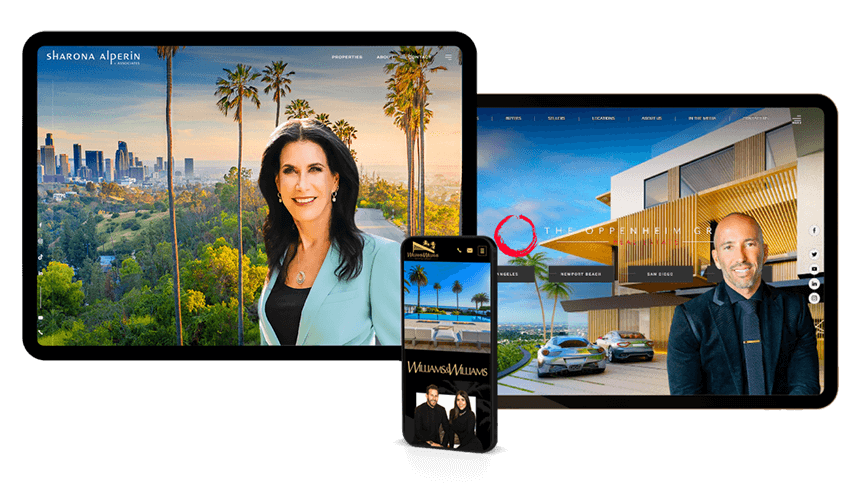Boost Your Online Reputation, Bolster Your Real Estate Business
What speaks for you even if you don’t utter a word?
Your reputation, of course. In fact, it’s one of the most valuable assets you own as an agent, especially since most people still find a realtor through referrals. Moreover, most folks are happy to work with their previous agents again — and refer them to others, too.

These numbers don’t lie: whether you land a client or not depends on whether you have a strong reputation. And in this digital-first world, that increasingly means having a sterling online presence. Thanks to the ubiquity of the internet, prospective clients can research and form an opinion of you without ever having met you. And if they don’t like what they see online, they’ll simply find another agent.
Why your online reputation is make or break
You’d never buy anything without verifying if it’s worth your hard-earned money. That’s even more true for houses, the single biggest purchase most people will make in their lifetime. So it’s unsurprising why buyers and sellers put such a premium on an agent’s reputation. Picking the wrong one can prove to be an expensive mistake.
Here’s why enhancing your online reputation should be at the top of your marketing to-do list:

-
First impressions matter
You don’t get a second chance to make a good first impression — not in a real estate market where every agent is battling it out for every single client’s business. If your online presence sets off any red flags, it’s next to impossible to sign a prospective client. Negative reviews, lack of information, and not having any online presence at all will drive would-be clients away. -
It’s all about credibility
Buyers and sellers will carefully vet shortlisted agents to see whether they can deliver what they promise. Does their website feature success stories? Do they have glowing online reviews? Given the amount of money involved in real estate transactions, people simply won’t risk working with dubious real estate professionals. -
Gain greater visibility
Whether buying or selling property, clients inevitably turn to search engines at some point in their real estate journey. As it happens, the most trustworthy websites are prioritized in Google search results. Why does this matter? Research has shown that over 54% of all clicks go to the top three results. If you’re not the top result, you’re not the top-of-mind choice.

Focus on these platforms to enhance your online reputation
Working smart is just as important as working hard. Paying attention to these three platforms will have the greatest effect on your online reputation in the least amount of time.
Website
No surprises here. Your website is your primary online platform and your most valuable piece of brand real estate. You want a website that’s beautifully designed, informative, and user-friendly. More importantly, you can use this channel to showcase your exclusive listings, success stories, and testimonials. Likewise, you can post content that spotlights your expertise and credibility such as buyer/seller guides, neighborhood features, market updates, and industry reports.
Social Media
Any real estate agent worth their salt ought to have a presence on the biggest social media channels: Facebook, Instagram, X (formerly Twitter), YouTube, TikTok, and LinkedIn. Doing so allows you to share informative and helpful content, post your latest listings, and engage with potential clients. Social channels also serve as an extension of your customer support as many folks message agents and brokers to inquire about their services. Certain ones also have a reviews section or an account verification option, which further bolsters your reputation.
Online Reviews
In an industry as reputation-reliant as real estate, word of mouth is still the best mode of advertising. Luckily, review platforms like Yelp and Foursquare make it easy for satisfied customers to share their experience of working with you. Claiming your Google My Business account also lets past clients leave a review of your business. Hearing straight from previous clients is vital because 91% of consumers aged 18-34 trust online reviews as much as personal recommendations.

Best practices for a strong online reputation
Online reputation management for real estate agents is an ongoing process. The job doesn’t end once your website, social presence, and online reviews are in order — in fact, the real work has only just begun. To make sure that your online presence is positive and stays that way, heed these tips:
-
Address negative comments, or review stat
No matter how excellent your service may be, you’re bound to get negative feedback — be it from an irate client or a bot. Just the same, address these reviews or comments ASAP to demonstrate that you care about customer satisfaction and that you intend to do right by your clients. PRO-TIP: Take the discussion off-platform (e.g. via email or direct message); you don’t want to air details of the complaint out in public for everyone to see. To save you time, create a customer response matrix with templated answers for positive, neutral, and negative feedback. -
Respond to messages ASAP
For many people, their house is the most important investment they’ll make. Understandably, they’ll expect hands-on service for this all-important transaction. By responding promptly to messages and inquiries, you show that you’ll be an attentive and responsive agent should prospects decide to hire you. -
Optimize for search engines
Even the best real estate websites won’t get traction without search engine optimization. This entails both on-page (strategic keyword integration) and off-page (load speed maximization) tweaks that can make your website rank higher in search results, leading to more clicks and leads. Oftentimes, it’s best to hire an SEO expert to do this highly technical task for you. -
Provide valuable content
Expertise is the #1 reason why buyers and sellers hire an agent. And you can showcase yours by creating informative blogs or reports that answer people’s burning questions about the real estate market. For instance, you can create detailed neighborhood guides so prospects can decide if a locale is right for their family. By regularly posting such content, you not only attract new visitors and repeat visitors, but you also position yourself as an authority in your real estate market. -
Showcase your success stories
At the end of the day, real estate clients want results — and your website is the best place to display yours. Some agents have a “Trophy Sales” section to spotlight high-profile deals they’ve closed. Others commission a “Results” section to highlight how they get above-asking selling prices or close homes in record time. -
Claim business profile pages
This entails claiming or making an account on platforms like Google My Business, Yelp, and Foursquare. Likewise, have your social media profiles verified (i.e. get a verified checkmark). Since you have to submit business documents before being granted “official” status, customers can rest assured that you’re a legitimate business rather than a fly-by-night outfit. -
Ask for client reviews
Some satisfied customers will voluntarily give you a five-star rating, but the vast majority of clients have to be asked for a review (even if they were happy with your service). Luckily, we have a guide on how to effectively but tactfully request a client testimonial. -
Monitor your online reputation
No one wants to be the object of negative online chatter, but if you happen to figure in a crisis, it’s best to catch and address it ASAP. You can set up Google Alerts or use online reputation management suites to be notified whenever you get mentions or reviews.
Online reputation management is hard — but it doesn’t have to be
With a real estate digital marketing agency like Agent Image at your side, you can enjoy a glowing reputation without spending hours optimizing your online presence.
For a FREE consultation, call 1.800.979.5799 or send a message here.




